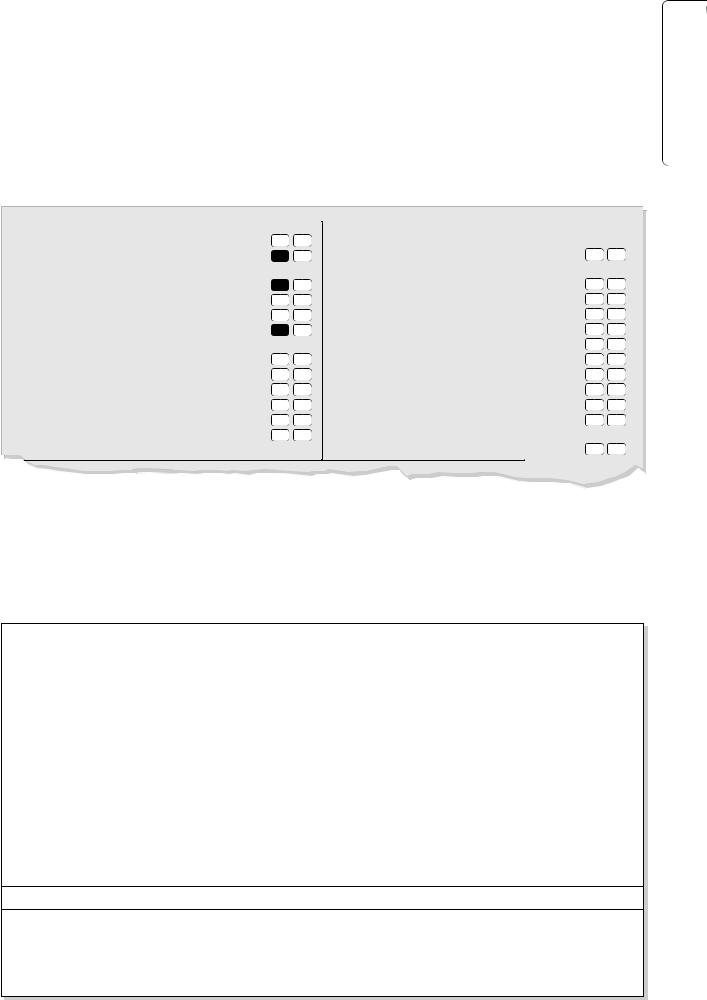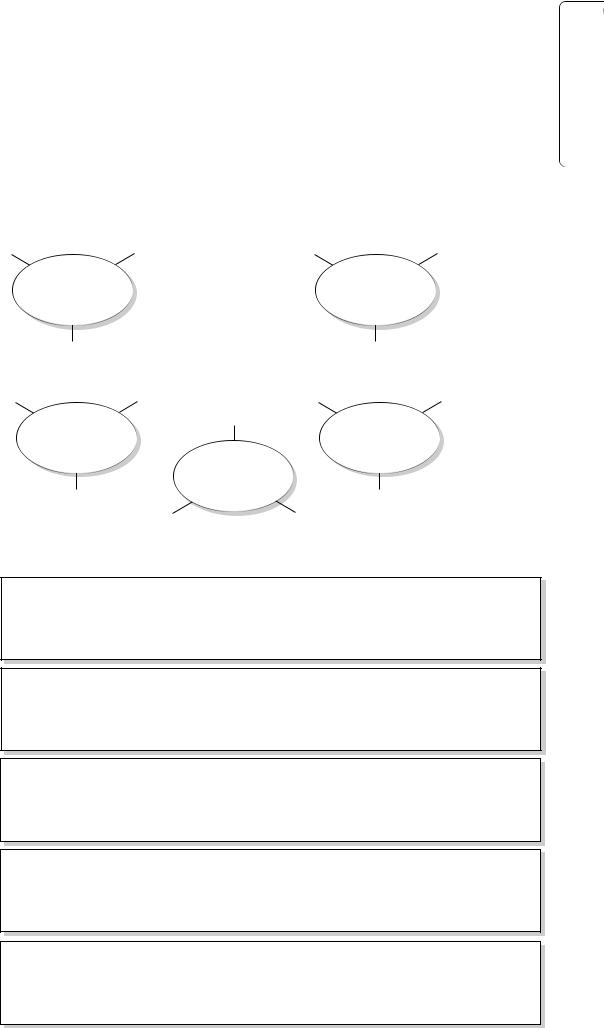
Frameworks
.pdf
9 Problems and solutions
1 Brainstorm.
1 What problems do you have at work? Complete the ideas maps.
Communication |
Technical |
Administrative |
problems |
problems |
problems |
MANAGEMENT
|
|
Personnel |
|
|
|
|
|
|
|
Marketing |
|
|
|
|
|
|
|
|
|
Financial |
|
|||||||
|
|
problems |
|
|
|
|
|
|
|
problems |
|
|
|
|
|
|
|
|
|
problems |
|
|||||||
|
|
|
|
|
|
|
|
|
|
|
|
|
|
|
|
|
|
|
|
|
|
|
|
|||||
2 Add to the following lists of verbs. |
with |
|
|
|
|
|
|
|
|
|
|
|
|
|
|
|
|
|
|
|
||||||||
1 |
to |
face |
/ |
analyse |
/ |
deal |
/ |
|
|
|
|
/ |
|
|
/ |
|
|
|
/ |
|
|
|
a problem |
|||||
2 |
to |
suggest |
/ |
find |
/ |
put |
forward |
/ |
|
|
|
/ |
|
|
/ |
|
|
|
/ |
|
|
|
a solution |
|||||
2Think of a problem you are currently having at work, and two possible solutions. Write notes.
|
Definition of the problem |
Background and probable causes |
|
|
|
||
|
|
|
|
|
|
|
|
|
Possible solution A |
|
|
|
|
|
|
|
Strengths: |
Weaknesses: |
|
|
|
|
|
|
● |
● |
|
|
● |
● |
|
|
|
|
|
|
|
|
|
|
Possible solution B |
|
|
|
|
|
|
|
Strengths: |
Weaknesses: |
|
|
|
|
|
|
● |
● |
|
|
● |
● |
|
|
|
|
|
|
|
|
|
3 Give a mini-presentation.
1 Present your problem and solutions to the group. Ask and answer questions.

MANAGEMENT
Teacher’s notes Management: 10 Personal management qualities
10 Personal management qualities
Before you start
1Are your students interested in this topic? Use the checklist on page 7.
2Which classroom management options will you follow? See pages 4–5.
3Do your students need language support for the discussions? See page 8.
Tip
Every business English student who is in work will find this framework relevant. Students with international experience at a higher level in their companies will find framework 11 offers them more opportunity to discuss their abilities in detail. See also the Extension section below for how to make this framework relevant to senior managers.
1Prepare.
1Get students to read through the management qualities 1–24 and check the vocabulary. (See Vocabulary box below.)
Vocabulary box
challenge: something new and different that needs a lot |
keeping up-to-date: knowing the most recent |
|
of skill and effort to do |
|
information |
setback: a problem that stops you from making progress |
being discreet: being careful about what you say |
|
|
|
|
|
|
|
2 Let students complete the Job and Me columns |
Tip |
|
individually, following the instructions. |
|
|
You may want to point out that qualities 17 and 18 are to |
||
2 Write notes. |
some extent opposites, as are 19 and 20. This should |
|
provoke more thought and discussion about these qualities. |
||
1Focus attention on the grids and check the vocabulary in the headings.
2Circulate while students make notes. Write down on a piece of paper any useful language needed or produced. Write a few language items of general interest on the board at the end.
3 Discuss.
1Which classroom management options will you follow? See pages 4–5.
2Circulate during the discussion. Make a note of good/bad language use.
Feedback slot
See page 5.
Extension
●Students in more senior management positions may enjoy discussing ‘Leadership’, a topic not otherwise covered in these frameworks. As a warmer for this topic, write on the board ‘How is leadership different from management?’. Continue the discussion. If you want more input for the discussion, here are six possible ‘principles’ of leadership:
1 Challenge existing processes. Encourage innovation and support people who have ideas. 2 Be enthusiastic. Inspire others through personal enthusiasm.
3 Help others. Be a team player and support the efforts and abilities of other people. 4 Set an example. Provide a role model for how others should act.
5 Celebrate achievements. Bring emotion into the workplace and bring together hearts as well as minds.
6 Vision. Have a clear sense of the future and communicate it to others.
●Students can write a short summary of their own personal management qualities, perhaps from the point of view of a Human Resources recruitment consultant writing a short report about them.

10 Personal management qualities
1 Prepare.
1 Study the management qualities below and check the vocabulary.
|
Job Me |
|
Job Me |
1 |
Having a good understanding of the market |
13 |
Having the ability to make difficult |
2 |
Having good product knowledge |
|
decisions under pressure |
3 |
Having a good personal image |
14 |
Having good lines of communication with |
|
(clothes, speech etc.) |
|
other staff |
4 |
Being a good administrator and organizer |
15 |
Keeping up-to-date by training and reading |
5 |
Having the ability to motivate people |
16 |
Having a good understanding of other cultures |
6 |
Being good at organizing your time |
17 |
Being strong and direct |
7 |
Knowing when to delegate and when to |
18 |
Being discreet and diplomatic |
|
refer to a higher level |
19 |
Being sociable and cooperative |
8 |
Being flexible about plans and targets |
20 |
Being independent and free-thinking |
9 |
Liking challenges |
21 |
Being honest and transparent |
10 |
Being a good team member |
22 |
Being a good talker |
11 |
Being able to take risks |
23 |
Being a good listener |
12 |
Being able to recover quickly after a setback |
24 |
Being able to go home and forget about |
|
|
|
work problems |
2 Look at the two columns.
●In the Job column put a tick ( ) for those qualities that you think are important in your job. Put a double tick ( ) for a few very important qualities.
●In the Me column put a tick ( ) for those qualities where you feel you are quite strong. Put a double tick ( ) for a few areas that are your real strong points. Put a question mark (?) for any areas where you feel you need further experience or training.
2 Write notes.
Choose two Job points with a double tick ( ). Why are they so important?
1
2
Choose two Me points with a double tick ( ). Give examples that demonstrate your abilities.
1
2
Choose two points where there is a difference between the Job and Me columns. Comment.
1
2
Other important qualities not included in the list
Job |
Me |
MANAGEMENT
3 Discuss.

MANAGEMENT
Teacher’s notes Management: 11 The international manager
11 The international manager
Before you start
1Are your students interested in this topic? Use the checklist on page 7.
2Which classroom management options will you follow? See pages 4–5.
3Do your students need language support for the discussions? See page 8.
Tip
This activity is really aimed at students who already consider themselves as international managers and who want a chance to talk about their skills and experience. It requires the students to be at a higher level of management (although not necessarily of language) than framework 10.
1 What skills does an international manager need? Brainstorm.
1 Focus attention on the ideas maps and check the vocabulary. (See Vocabulary box below.)
Vocabulary box
competitive advantage: something that helps a company |
uncertainty: not knowing what will happen |
to be more successful than its competitors |
feedback mechanism: a process that makes it possible |
strategy: a general set of plans |
to know how good or useful something is (so that you |
objectives: specific targets/goals |
can improve it) |
2Get students to brainstorm further vocabulary in pairs or small groups.
3Elicit answers and write them on the board. (No suggestions are given here as the answers depend on individual situations and points of view.)
Tip
Point out that the final oval with the question mark is left for the students to think of their own ideas. If students can’t think of anything for this final oval, some suggestions are: Promoting knowledge across the organization, Turning threats into opportunities, Flexibility, Training self and coaching others etc.
2 Write notes about your own experience and skills.
1Focus attention on the grids and check the vocabulary in the headings. Remind students that the final box with the question mark corresponds to the oval with the question mark in section 1.
2Circulate while students make notes. Write down on a piece of paper any useful language needed or produced. Write a few language items of general interest on the board at the end.
Tip
Tell students that they should make notes on specific activities/situations that they have actually done in their jobs. Point out that if they ever go for an interview for an international management position, they will have to give examples of their own experience in exactly this kind of way.
3 Discuss.
1Which classroom management options will you follow? See pages 4–5.
2Circulate during the discussion. Make a note of good/bad language use.
Feedback slot
See page 5.
Extension
●Students can write a short summary of their own management abilities, perhaps from the point of view of a Human Resources recruitment consultant writing a short report about them.
●Consider repeating the activity in a later lesson e.g. with a different partner. See page 5.

11 The international manager
1 What skills does an international manager need? Brainstorm.
Ability to translate an international strategy into individual business unit objectives
Developing competitive advantage
Ability to balance conflicting business interests in an organization
Dealing with complexity and uncertainty
Ability to promote cross-cultural understanding within teams
Building teams
Ability to establish new business processes with responsive feedback mechanisms
Innovating
?
2 Write notes about your own experience and skills.
Developing
My experience competitive My experience
advantage
Building teams
My experience
Dealing with
complexity and My experience uncertainty
Innovating
My experience
?
My experience My experience
MANAGEMENT

MANAGEMENT
Teacher’s notes Management: 12 Business ethics: a case study
12 Business ethics: a case study
Before you start
1 Are your students interested in this topic? Use the checklist on page 7. 2 Which classroom management options will you follow? See pages 4–5.
3 Do your students need language support for the discussions? See page 8.
1 Check the vocabulary and continue the lists.
Tasks 1 and 2
1 Get students to read through the lists in tasks 1 and 2 and check the vocabulary. (See Vocabulary box below.)
Vocabulary box
ethics: rules of behaviour used to decide what is right and wrong (ethical behaviour ≠ unethical behaviour)
bribery: giving money to someone dishonestly to persuade them to help you
kickback: (informal) money that a person gets for secretly and dishonestly helping someone
layoffs/redundancies: when workers’ jobs are stopped because there is not enough work
diversity issues: these include race, gender, religion, sexual orientation
sexual harassment: threatening or offensive behaviour towards someone of the opposite sex
insider trading: when someone uses knowledge that is not available to other people in order to buy or sell shares price fixing: when companies agree on the price they will
charge in order to avoid competing with each other whistleblower: someone who tells people in authority
about dishonest or illegal practices
NGOs: non-governmental organizations e.g. Greenpeace, Save The Children, church organizations, single-issue pressure groups etc.
Tip
Teach higher-level students the word stakeholder: a person or organization that is involved in an issue, project, system etc., especially because they have a financial interest. Note that all the people listed in task 2 are stakeholders.
2 Get students to continue the lists. Tip
2 Write notes.
Tasks 1 and 2
1 Establish that students will each introduce a case that they know about personally. It could be in their industry, a case they know about through a friend, or one that has been in the news recently.
2 Focus attention on the grids and check the vocabulary in the headings. (See Vocabulary box opposite.) Point out that in task 2 students don’t have to fill in every box. Get students to write notes.
3Circulate while students make notes. Write down on
a piece of paper any useful language needed or produced.
Write a few language items of general interest on the board at the end.
3 Give a mini-presentation. Ask for questions.
1 Explain that each student will give a mini-presentation to the class.
2 When it is their turn, let each student sit at the front and lead the session. Consider joining the group as a participant asking questions yourself, or sit away from the group. Make a
note of good/bad language use.
Tip
Feedback slot |
Use any interesting cases to make a ‘case study’ |
|
See page 5. |
worksheet to use with other classes, changing the original |
|
company name and any personal details. |
||
|
Extension

12 Business ethics: a case study
1Check the vocabulary and continue the lists.
1What kind of business issues can have an ethical dimension?
dishonesty in communications with top management/clients/government agencies, dishonesty in advertising, low wages/poor conditions/child labour in factories overseas, doing business on the basis of friendship/family connections, problems with gifts/entertainment, bribery, kickbacks, government officials asking for ‘consultancy fees’, layoffs/redundancies, environmental issues, animal rights issues, employee privacy issues (e.g. data protection), diversity issues, sexual harassment, insider trading, price fixing, dumping
2Who/What can be affected by unethical behaviour?
the whistleblower, key decision makers (individuals), co-workers, employees and their families, top managers/the board of directors, shareholders, customers, suppliers, competitors, government and its agencies, lawyers and courts, consumer groups, environmental groups, NGOs, other special interest groups, people in the local community, the environment (water, air, plants, animals, natural resources), future generations
2Write notes.
1Write notes about an ethical issue that you know about. You will present it to the group as a case study.
What happened?
What happened?
Background |
The main events |
Consequences |
2 Choose five people/things affected by the case. Write notes in any relevant boxes.
Harm |
Benefit |
Rights |
Responsibilities |
1
2
3
4
5
MANAGEMENT
3 Give a mini-presentation. Ask for questions.
